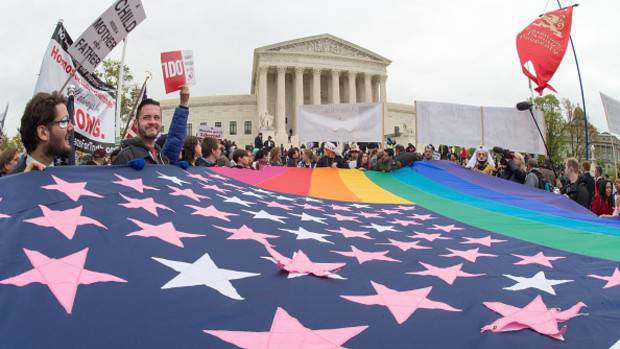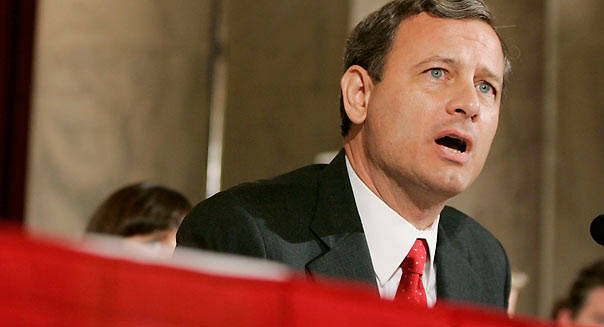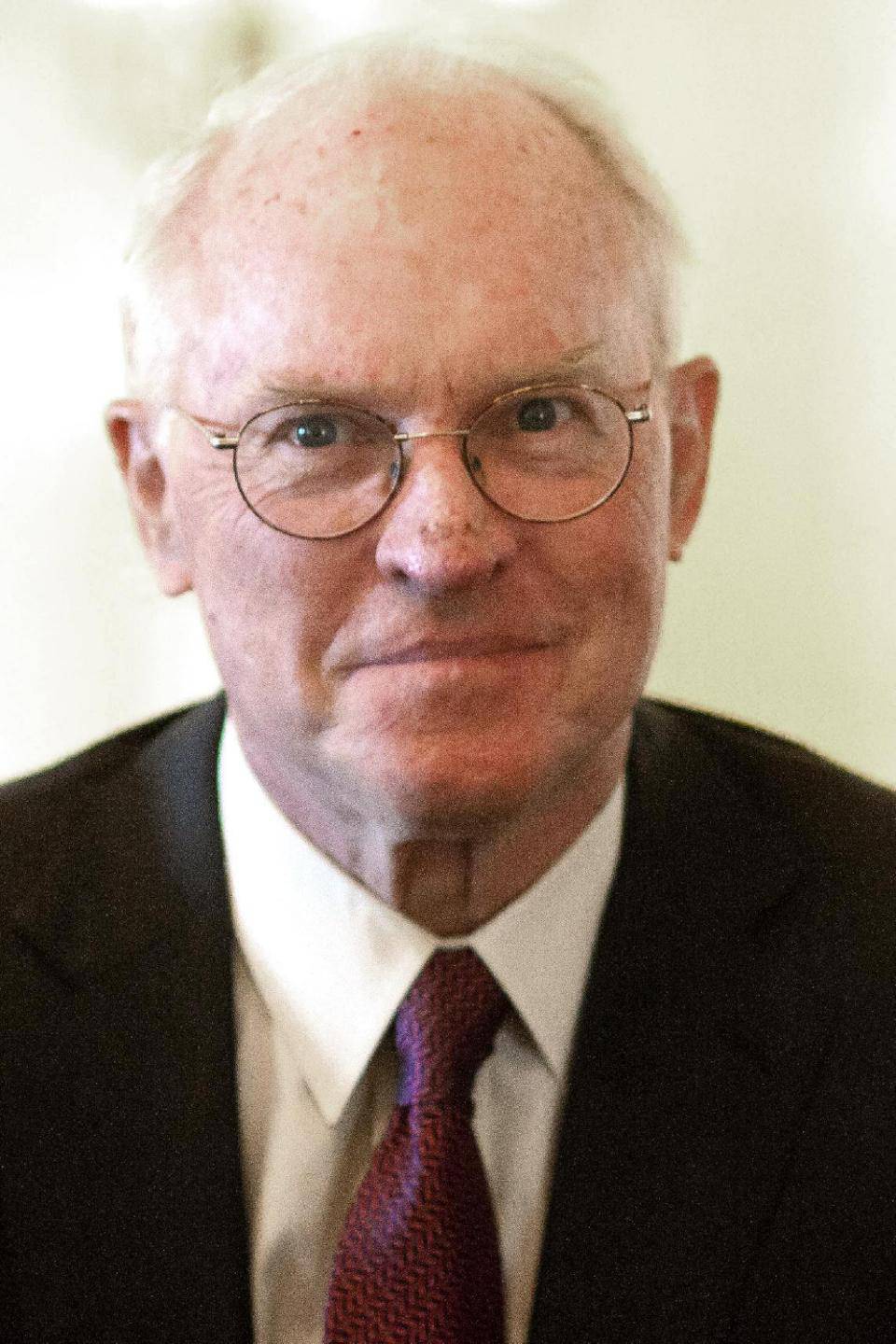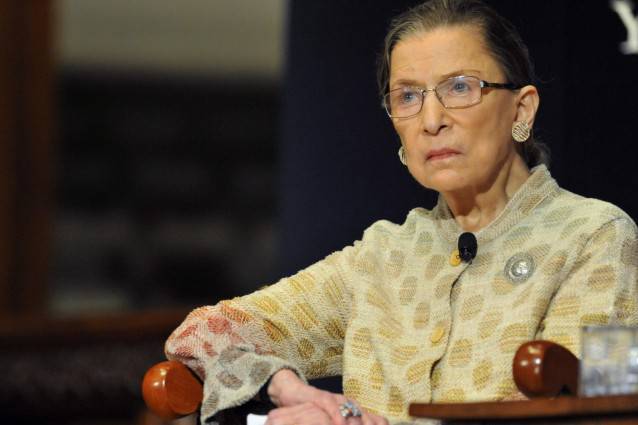- Joined
- Jan 25, 2014
- Messages
- 11,991
- Reaction score
- 1,411
- Points
- 159
Don't Panic! Gay Marriage Will Win
BloombergView | By Noah Feldman | April 27, 2015 3:32 PM EDT

EXPECTATIONS ARE RUNNING HIGH
SOURCE
BloombergView | By Noah Feldman | April 27, 2015 3:32 PM EDT

EXPECTATIONS ARE RUNNING HIGH
Predicting exactly what the justices will say at oral argument is a tricky business -- but predicting the reaction is more tractable. After the U.S. Supreme Court hears arguments in the gay-marriage cases Tuesday, you can expect a moment of serious anxiety among those who hope that the court is about to declare a fundamental constitutional right to marry the partner of one’s choice.
The reason is simple: Justice Anthony Kennedy isn't going to declare from the bench how he’s going to rule. At least some questions from some justices are likely to raise the question of whether the court should decide the issue now or wait for some unspecified time.
The result will be a feeling of letdown and nervousness among gay-marriage supporters. Because expectations are so high right now, anything short of a Supreme Court lovefest is going to produce a feeling of vertigo -- and the worry that perhaps, after all, Kennedy might not be ready to do the right thing.
In advance of that almost inevitable sentiment, let me reassure you -- or if you have the opposite view, let me deliver the bad news: Kennedy is going to write an opinion holding that what he calls the right to equal dignity requires states to allow marriages between two people of the same sex.
How do I know this? Because the decision will be the culmination of almost 20 years of preparation by Kennedy. He’s been developing gay rights in a series of decisions, each one a landmark in its own way. He can't turn back now, because he's already built the scaffolding.
If Kennedy’s long-term project isn't enough to convince you, consider this: Kennedy has at this point much to gain by creating the marriage right, and almost nothing to lose.
Kennedy's journey to this moment began in the 1996 case of Romer v. Evans, which arose from a ballot initiative that amended the Colorado state constitution to deny any “protected status” to gays or lesbians under state law.
When the amendment was enacted, it wasn't at all clear under existing law whether it violated the federal Constitution. On its face, the law seemed only to say that sexual orientation can be listed alongside race, religion or sex as prohibited categories of discrimination in Colorado. The Department of Justice under Attorney General Janet Reno and President Bill Clinton didn't even file a friend of the court brief arguing that the law was unconstitutional.
Kennedy, however, adopted a creative and far-reaching constitutional theory, first proposed by my Harvard Law School colleague Laurence Tribe (yes, the one everyone's mad at because of his attack on the Barack Obama administration's clean coal regulation). According to Kennedy, the law on its face violated the equal protection clause because it literally made it harder for gay people than for others to gain protection. The law, Kennedy said, was motivated by bare desire to harm an unpopular group.
Justice Antonin Scalia, in one of his many memorable turns of phrase, said that Kennedy's opinion had “mistaken a Kulturkampf for a fit of spite.” To Scalia, the political process was exactly the right venue for a cultural struggle over whether homosexuality should be thought of as morally acceptable. Kennedy fundamentally disagreed. He thought that the courts, not the legislature, should decide on the moral matter of the equality of persons, regardless of sexual orientation.
In 1996, this was a major step for a justice, particularly one appointed by Ronald Reagan. Seven years later, in Lawrence v. Texas, Kennedy took his approach one step further, holding that the “dignity” of “free persons” required a constitutional invalidation of laws against gay sex. This 2003 decision played an important role in shaping and consolidating broader American support for gay rights. Scalia, in dissent, called the decision “the product of a court, which is the product of a law-profession culture, that has largely signed on to the so-called homosexual agenda.” But blaming law professors was beside the point: Public opinion was moving, and Kennedy was moving it.
After Lawrence, Kennedy waited a full decade until the 2013 decision in U.S. v. Windsor, which struck down the federal Defense of Marriage Act that had allowed states to ignore gay marriages performed in other states. Kennedy bided his time as the marriage equality movement grew. He didn't want to produce a backlash by announcing a fundamental right to marriage before the public was ready. And indeed, in the 2013 opinion, he held back from declaring such a right, although he could easily have done so. Kennedy wanted public opinion to go just a little bit further. As lower courts increasingly interpreted the Windsor precedent to require gay marriage, there has been a flight to religious liberty arguments by gay-marriage opponents -- but there hasn't been a major national upheaval.
So the time is right -- but that's not all. Kennedy has already paid a significant price among erstwhile conservative admirers for creating the jurisprudence of gay rights. The negative sentiment against him on these grounds can't get any worse. Indeed, his critics have already assimilated the expectation that he will declare a general right to gay marriage. Refusing to do so wouldn't win back any of his detractors.
Yet balking now after two decades would cost Kennedy the admiration of the liberals who have gradually accepted him as one of the most important liberal justices of the modern era, at least when it comes to individual liberty and equality. Liberals don't want a gay-marriage right to come “with all deliberate speed,” the way the court hoped desegregation would happen come after Brown v. Board of Education. They're ready now.
So keep calm and don’t carry on. Some momentary concern after Tuesday's oral argument is natural. But Kennedy is going to do the right thing. What choice does he have?
SOURCE



